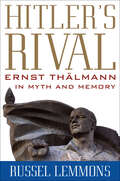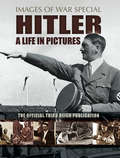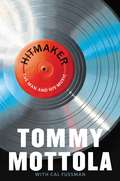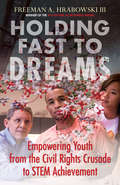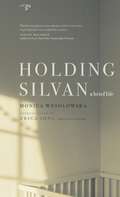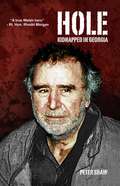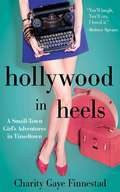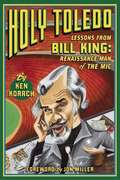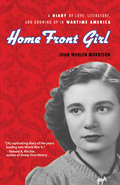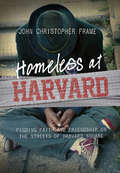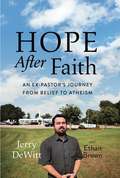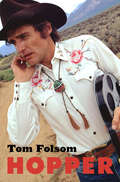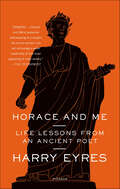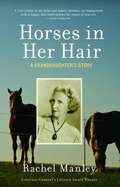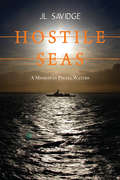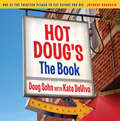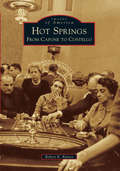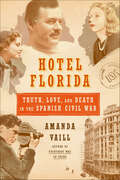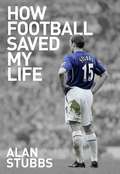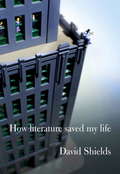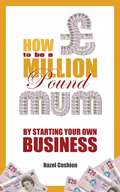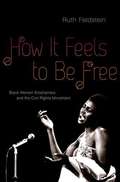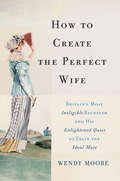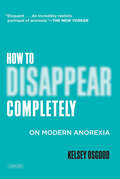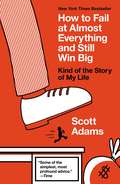- Table View
- List View
Hitler's Rival: Ernst Thälmann in Myth and Memory
by Russel Lemmons“Fascinating material . . . This book will likely be the last word and the standard work on the Thälmann myth and its role in East German history.” —Catherine Epstein, author of Nazi Germany: Confronting the MythsThroughout the 1920s, German politician and activist Ernst Thälmann (1886–1944) was the leader of the largest Communist Party organization outside the Soviet Union. Thälmann was the most prominent left-wing politician in the country’s 1932 election and ran third in the presidential race after Hitler and von Hindenberg. After the Nazi Party’s victory in that contest, he was imprisoned and held in solitary confinement for eleven years before being executed at Buchenwald concentration camp in 1944 under the Führer’s direct orders.Hitler’s Rival examines how the Communist Party gradually transformed Thälmann into a fallen mythic hero, building a cult that became one of their most important propaganda tools in central Europe. Author Russel Lemmons analyzes the party intelligentsia’s methods, demonstrating how they used various media to manipulate public memory and exploring the surprising ways in which they incorporated Christian themes into their messages. Examining the facts as well as the propaganda, this unique volume separates the intriguing true biography of the cult figure from the fantastic myth that was created around him.“Lemmons analyzes in great detail the myth and legend that formed around Ernst Thälmann, who became the leader of the German Communist Party in 1925 and was a dominant politician in Weimar Germany until imprisoned by the Nazis in 1933. This comprehensive study, which treats the years before the war ended for the first time, is thoroughly researched and well written; it will be a standard work on the subject.” —G. P. Blum, Professor Emeritus, University of the Pacific
Hitler: The Official Third Reich Publication (Images of War Special)
by Bob CarruthersThis exceptional source is probably the best of the contemporary accounts of Hitler in power, albeit from a heavily pro-Nazi stance. The testimonies collected together were based on interviews conducted by Heinz A. Heinz in 1933 and 1934, shortly after Hitler had taken power.Millions of ordinary Germans fell under Hitler's spell and this book is a creation of those emotions. It is very much a product of its time. Written by the party big-wigs, such as Goering, Speer and Goebbels, and published in 1935 under the title Adolf Hitler Bilder Aus Dem Leben Des Furhers, it appeared at a time when they were at the height of their unrivaled powers. This fascinating volume encompasses the superb photography of Heinrich Hoffman, the Munich photographer who was ever present on Hitler's journeys and who grew fabulously wealthy as a result of his intimate access to Hitler. Hitler had an innate understanding of what we would now call public relations. He recognised the excellence of Hoffman's photography and maintained control of his image by limiting the access of other photographers. He also strictly controlled Hoffmann's activities and personally selected the portraits that were allowed to go into circulation.The book incorporates sections on Hitler and the German people, Hitler and the German workers, Hitler and public works and so on, all accompanied by a series of excellent photographs which form a remarkable record of the public face of a man during his brief spell of absolute power. The Nazis were the first party who harnessed the full power of the media in a coherent and all-embracing manner.This is a classic example of the strength of their presentation skills. It is a compelling time-capsule which conveys vividly in almost visceral way the zeitgeist of the thirties in Nazi-Germany. By 1935 the bulk of the German people had fallen in behind Adolf Hitler, and with documents as persuasive as this, it is not too difficult to comprehend the allure of the glittering faade which a stream of publications such as this book sought to create and maintain.
Hitmaker: The Man and His Music
by Cal Fussman Tommy MottolaMuch has been written about Tommy Mottola, one of the most powerful, visionary, and successful executives in the history of the music industry. He discovered, developed and launched the careers of many superstars, including Mariah Carey, Celine Dion, Shakira, Jennifer Lopez and Gloria Estefan, and is credited with creating the "Latin Explosion." He has had the privilege of working alongside Bruce Springsteen, Billy Joel, Bob Dylan, Beyonce, Michael Jackson, Barbara Streisand, the Dixie Chicks, Pearl Jam, Aerosmith, Tony Bennett, and Ozzy Osbourne, amongst other music giants. This is his story--a story of the modern music industry, from Elvis to the iPod--through the eyes of the man who made much of it happen.HITMAKER recounts how a kid from the Bronx--and a college dropout--became one of the music industry's most creative and controversial CEOs. For the first time, Tommy lays bare the facts behind the most sensational aspects of his life, such as being married to and developing the career of Mariah Carey, managing Michael Jackson's emotional ups and downs, and the power struggle with his onetime boss and mentor Walter Yetnikoff. HITMAKER will take you inside this world of power, money, and fame as he recounts the fascinating dealings with countless icons, and what it was like to be at the top when the business suddenly changed. Tommy's story is one that will never be duplicated--and here it is, in his own voice, for the first time.
Holding Fast to Dreams
by Freeman A. Hrabowski IIIAn education leader relates how his experiences with the civil rights movement led him to develop programs promoting educational success in science and technology for African Americans and others. When Freeman Hrabowski was twelve years old, a civil rights leader visited his Birmingham, Alabama, church and spoke about a children's march for civil rights and opportunity. That leader was the Reverend Martin Luther King Jr., and that march changed Hrabowski's life. Until then, Freeman was a kid who loved school and solving math problems. Although his family had always stressed the importance of education, he never expected that the world might change and that black and white students would one day study together. But hearing King speak changed everything for Hrabowski, who convinced his parents that he needed to answer King's call to stand up for equality. While participating in the famed Children's Crusade, he spent five terrifying nights in jail--during which Freeman became a leader for the younger kids, as he learned about the risk and sacrifice that it would take to fight for justice. Hrabowski went on to fuse his passion for education and for equality, as he made his life's work inspiring high academic achievement among students of all races in science and engineering. It also brought him from Birmingham to Baltimore, where he has been president of the University of Maryland, Baltimore County for more than two decades. While at UMBC, he co-founded the Meyerhoff Scholars Program, which has been one of the most successful programs for educating African Americans who go on to earn doctorates in the STEM disciplines. In Holding Fast to Dreams, Hrabowski recounts his journey as an educator, a university president, and a pioneer in developing successful, holistic programs for high-achieving students of all races.From the Hardcover edition.
Holding Silvan: A Brief Life
by Erica Jong Monica WesolowskaIn the opening of Holding Silvan: A Brief Life, Monica Wesolowska gives birth to her first child, a healthy-seeming boy who is taken from her arms for "observation" when he won't stop crying. Within days, Monica and her husband have been given the grimmest of prognoses for Silvan, and they must make a choice about his life. The story that follows is not a story of typical maternal heroism. There is no medical miracle here. Instead, we find the strangest of hopes. Certain of her choice, Monica must still ask herself at every step if she is loving Silvan as well as a mother can. The result is a page-turning testimony to the power of love. By raising ethical questions about how a death can be good in the age of modern medicine, Holding Silvan becomes a joyous paean to what makes life itself good. Whether you have suffered profound loss or not, this book will change your life.
Hole: Kidnapped in Georgia
by Peter ShawIn June 2002, Peter Shaw, a banker from Wales, was brutally kidnapped by a Pseudo-military organisation in a busy suburb of Tbilisi, the capital city of Georgia, in eastern Europe. Hole is the harrowing account of his five month captivity and subsequent 'escape' in November 2002. Peter's powerful and moving story focuses on how he managed to ensure the physical and mental torture inflicted upon him by his captors, particuarly during the 141 days when he was held in apalling conditions, chained by the neck in a tiny cell three meters underground, unlit, cold, wet and isolated. His eventual reunion with his loved ones provides a moving climax to the story.
Hollywood in Heels: A Small-Town Girl's Adventures in Tinseltown
by Charity G. FinnestadHollywood in Heels is a sexy, smart, shockingly honest and wickedly hilarious memoir of a young woman finding her way in a city where sex is the primary commodity and illusion the name of the game. Charity Gaye Finnestad is a small-town girl with big dreams: to go to Los Angeles and make it as a writer.With only enough money to survive sixty days, she packs her bags, says goodbye to an unhappy marriage, and hits the road in search of her destiny. Struggling to pay the rent with occasional modeling jobs, Charity suddenly finds herself privy to a high-flying, fast-paced life--sipping champagne at exclusive parties with A-list celebrities in the Hollywood Hills by night, and shopping at the 99-Cent Store by day to stretch her tiny budget. She quickly discovers that in Hollywood, as with anywhere, it's your relationships that matter. Determined to be true to herself, she sets out to make lasting friendships and maybe even discover true love along the way. Fearless and forthright, Charity delivers the dirt on the ups and downs of living in Tinsel Town. A modern day fairy tale in which the heroine rescues herself and then meets her Prince Charming, Hollywood in Heels is a rollicking fun read that teaches some very important lessons about life and love.
Holy Toledo: Lessons from Bill King, Renaissance Man of the Mic
by Ken KorachBill King, longtime voice of the A’s, Warriors and Raiders, was a beloved figure in California for decades, celebrated for his passion and precision in calling a game and for his colorful life away from sports, an utterly original figure who lives today in the hearts and memories of countless fans. Bill was also one of the most influential broadcasters of all time, an inspiration to legions of his fellow broadcasters who looked up to him. Ken Korach, longtime voice of the A’s and Bill’s partner for ten seasons until King’s death in 2005, is the perfect one to bring Bill to life on the page. A half-century ago, Ken Korach was a kid in Los Angeles, spinning the night dial to tune in Warriors basketball games from faraway San Francisco for one reason: He just had to hear Bill. Now he tells the remarkable story of King the legendary baseball, basketball and football broadcaster, the student of Russian literature, the passionate sailor, the fan of eating anything and everything from gourmet to onions and peanut butter, the remarkable painter. Korach draws on a lifetime of listening to and learning from King – as well as extensive research, including more than fifty interviews with King’s family members, colleagues, friends and associates – to create this rich portrait. Holy Toledo features a moving foreword by Hall of Fame broadcaster Jon Miller, previously of ESPN, and a brilliant cover by Mark Ulriksen, internationally recognized for his New Yorker magazine covers, that captures King’s flair and personality. Billy Beane “The best part about Bill wasn’t just that he was so good at his job but that he was so interesting outside of his job. His mustache epitomized that. He looked eccentric and he was eccentric, in a good way.” Bob Welch “If I had a hitter I had trouble with, I’d ask Bill how I should pitch him. He always had a good answer.” Greg Papa “Bill King was the greatest radio broadcaster in the history of the United States.” Tom Meschery “Talking with Bill was like talking with an encyclopedia. If you wanted to talk sports, literature – when Bill talked you listened, because he always had something interesting to talk about.” Al Attles “He didn’t sugarcoat it. Bill was a departure from the way it was. If a player from the Warriors made a mistake, Bill told it like it was.” Ed Rush “I’d put the radio out the window and keep turning it to certain angles and it would go in and go out. I’d listen to the Warriors and the Raiders. To do all three sports like he did, he was phenomenal. He was out of this world.” Tom Flores “Bill made some of the great plays in the history of the Raiders even greater with his description. Those moments were kept alive in his voice.” Jason Giambi “He was such an incredible man. I had so much fun with him and he would always ask how my family was doing and I have the fondest memories of him. We would talk about life and all the things he had seen. He made me well rounded.” Rick Barry “He had the ability to see a game, a basketball game, and express what was happening in eloquent terms, at times instantaneously. When he was saying something, it was happening."
Home Front Girl: A Diary of Love, Literature, and Growing Up in Wartime America
by Susan Signe Morrison Joan Wehlen MorrisonWednesday, December 10, 1941"Hitler speaks to Reichstag tomorrow. We just heard the first casualty lists over the radio. . . . Lots of boys from Michigan and Illinois. Oh my God! . . . Life goes on though. We read our books in the library and eat lunch, bridge, etc. Phy. Sci. and Calculus. Darn Descartes. Reading Walt Whitman now." This diary of a smart, astute, and funny teenager provides a fascinating record of what an everyday American girl felt and thought during the Depression and the lead-up to World War II. Young Chicagoan Joan Wehlen describes her daily life growing up in the city and ruminates about the impending war, daily headlines, and major touchstones of the era--FDR's radio addresses, the Lindbergh kidnapping, Goodbye Mr. Chips and Citizen Kane, Churchill and Hitler, war work and Red Cross meetings. Included are Joan's charming doodles of her latest dress or haircut reflective of the era. Home Front Girl is not only an entertaining and delightful read but an important primary source--a vivid account of a real American girl's lived experiences.
Homeless at Harvard: Finding Faith and Friendship on the Streets of Harvard Square
by John Christopher FrameHarvard Square is at the center of Cambridge, Massachusetts, and is the business district around Harvard University. It’s a place of history, culture, and some of the most momentous events of the nation. But it’s also a gathering place for some of the city’s homeless.What is life like for the homeless in Harvard Square? Do they have anything to tell people about life? And God?That’s what Harvard student John Frame discovered and shares in Homeless at Harvard. While taking his final course at Harvard, John Frame stepped outside the walls of academia and onto the streets, pursuing a different kind of education with his homeless friends.What he found—in the way of community and how people understand themselves---may surprise you.In this unique book, each of these urban pioneers shares his own story, providing insider perspectives of life as homeless people see it. This heartwarming page-turner shows how John learned with, from, and about his homeless friends—who together tell an unforgettable story—helping readers’ better understand problems outside themselves and that they’re more similar to those on the streets than they may have believed.
Hope After Faith: An Ex-Pastor's Journey from Belief to Atheism
by Jerry DewittAtheism's leading lights have long been intellectuals raised in the secular and academic worlds: Richard Dawkins, Sam Harris, and the late Christopher Hitchens. <P><P> By contrast, Jerry DeWitt was born and bred into the church and was in fact a Pentecostal preacher before arriving at atheism through an extraordinary dialogue with faith that spanned more than a quarter of a century. Hope After Faith is his account of that journey. DeWitt was a pastor in the town of DeRidder, Louisiana, and was a fixture of the community. In private, however, he'd begun to question his faith. Late one night in May 2011, a member of his flock called seeking prayer for her brother who had been in a serious accident. As DeWitt searched for the right words to console her, speech failed him, and he found that the faith which once had formed the cornerstone of his life had finally crumbled to dust. When it became public knowledge that DeWitt was now an atheist, he found himself shunned by much of DeRidder's highly religious community, losing nearly everything he'd known. DeWitt's struggle for identity and meaning mirrors the one currently facing millions of people around the world. With both agnosticism and atheism entering the mainstream-one in five Americans now claim no religious affiliation, according to a recent study-the moment has arrived for a new atheist voice, one that is respectful of faith and religious traditions yet warmly embraces a life free of religion, finding not skepticism and cold doubt but rather profound meaning and hope. Hope After Faith is the story of one man's evolution toward a committed and considered atheism, one driven by humanism, a profound moral dimension, and a happiness and self-confidence obtained through living free of fear.
Hopper
by Tom FolsomJames Dean to Hopper "I saw what you did today. Today you were great. " Jack Nicholson to Hopper "We're geniuses, you know that? Isn't it great to be a genius?" The chopper-riding hippie outlaw in Easy Rider. The prophetic madman in the jungle in Apocalypse Now. The terrifying psychopath in Blue Velvet. The kid gone wrong in Rebel Without a Cause. The actor taken under the wing of James Dean who longed to be the next Orson Welles. The hell-raising director who revolutionized Hollywood. An enigmatic man from Dodge City, Kansas, on an endless quest to realize the American Dream. Dennis Hopper has been described as a rebel, an icon, an addict plagued by demons, and one of the most important champions of the pop-art movement. Friend to Warhol, muse to David Lynch, mentor to Sean Penn, champion of Ice-T, Dennis Hopper built a career that was a half-century of rebellion waged at the edge of American popular culture. Tom Folsom's Hopper is a wild ride through Dennis's many lives. Featuring hundreds of interviews with Hopper's fellow actors, artists, musicians, and residents of Taos, New Mexico (where he spent much of his most manic time), as well as his ex-wives and many other people who knew him, Hopper takes you on an extraordinary-and sometimes troubling-journey. From Dennis's early days with his grandparents on a dusty farm in Kansas, where he watched trains go by on their way to Los Angeles, to his formative time in Hollywood as one of a bright new crop of actors straddling the edge of the studio system, to the rebellious 1960s and the start of the independent film movement, to the drug-addled 1970s and beyond, when Hopper staged one of the greatest Hollywood comebacks of all time-Tom Folsom has crafted a biography as unconventional as Dennis Hopper himself.
Horace and Me: Life Lessons from an Ancient Poet
by Harry EyresA wise and witty revival of the Roman poet who taught us how to carpe diemWhat is the value of the durable at a time when the new is paramount? How do we fill the void created by the excesses of a superficial society? What resources can we muster when confronted by the inevitability of death? For the poet and critic Harry Eyres, we can begin to answer these questions by turning to an unexpected source: the Roman poet Horace, discredited at the beginning of the twentieth century as the "smug representative of imperialism," now best remembered—if remembered—for the pithy directive "Carpe diem." In Horace and Me: Life Lessons from an Ancient Poet, Eyres reexamines Horace's life, legacy, and verse. With a light, lyrical touch (deployed in new, fresh versions of some of Horace's most famous odes) and a keen critical eye, Eyres reveals a lively, relevant Horace, whose society—Rome at the dawn of the empire—is much more similar to our own than we might want to believe. Eyres's study is not only intriguing—he retranslates Horace's most famous phrase as "taste the day"—but enlivening. Through Horace, Eyres meditates on how to live well, mounts a convincing case for the importance of poetry, and relates a moving tale of personal discovery. By the end of this remarkable journey, the reader too will believe in the power of Horace's "lovely words that go on shining with their modest glow, like a warm and inextinguishable candle in the darkness."
Horses in Her Hair
by Rachel ManleyEdna Manley came to Jamaica in 1922 as the wife of a national hero and mother to Jamaica's fifth prime minister. But she had her own contributions to make as artist, mother, wife, behind-the-scenes politician, mystic, and seer. In this intimate biography, her granddaughter Rachel Manley tells Edna's remarkable story from her artistic achievements to the demons that haunted her. Set in imperial England and colonial and postcolonial Jamaica, Horses in Her Hair profiles a larger-than-life figure who left an indelible mark on every culture in which she lived.
Hostile Seas: A Mission in Pirate Waters
by Jl SavidgeSet during a period of dramatically escalating piracy, Hostile Seas is a personal account of a mission on board a naval warship in the waters off Somalia. In late 2008, piracy around the Horn of Africa escalated dramatically, threatening the passage of international merchant ships through a critical waterway. Not only were ships carrying goods to North America and Europe affected, but also vessels entrusted with food aid for a Somali population suffering the effects of prolonged drought and civil war.In response, the Canadian government redirected naval frigate HMCS Ville de Québec from the Mediterranean Sea to Somali waters to escort pirate-menaced vessels carrying World Food Programme aid to Mogadishu. Told from the perspective of a ship’s officer, Hostile Seas is a personal account of life on board a deployed navy ship that explores the tension between military imperatives and individual needs as a succession of hijackings brings into focus the reality of Somali piracy.
Hot Doug's: The Book
by Kate Devivo Doug Sohn Graham ElliotWhen it comes to hot dogs, Hot Doug's head chef Doug Sohn is the master of the craft. His introduction of gourmet ingredients and professionally trained culinary flair to the world of encased meats has earned him national recognition and praise. In Hot Doug's: The Book, Sohn takes the reader on a fun, irreverent trip through the history of hot dogs, his restaurant, and the many patrons -- both famous and average Joe -- who have declared Sohn the king of dogs.As told through Sohn's own stories, this book will combine photos, favorite anecdotes, lessons learned, and lists ranging from general restaurant etiquette to most-repeated sausage double-entendres (Doug's heard 'em all). Stories included will reveal fact from the folklore of the restaurant's founding, retell the tale of Hot Doug's infamous 2006 run-in with Chicago City Hall, and even provide accounts of Hot Doug's-inspired tattoos, which if presented upon order privilege the bearer to free hot dogs for life. Contributions from some of Hot Doug's biggest fans will be spread throughout the book, with raves from Paul Kahan, Steve Albini, Dan Sinker, Mindy Segal, Homaro Cantu, Aziz Ansari, many other local and national figures, and an introduction from Graham Elliot.
Hot Springs: From Capone to Costello (Images of America)
by Robert K. RainesIn the late 1800s, Hot Springs, Arkansas, was a small town with a big attraction: hot thermal water. The federal government took possession of the downtown-area springs, and bathhouse row was born, along with the first property that would be considered a national park. Following not too far behind were great entrepreneurs who brought in gambling and prostitution to go with the area's leading industry: moonshining. By the time the 20th century rolled in, Hot Springs was booming with tourists and became America's first resort. In the early 1930s, former New York gangster Owen Madden took up residence in the spa city, and things became very organized. Gangland luminaries from Al Capone to Frank Costello made regular pilgrimages over the next few decades to what was referred to as "the loose buckle in the Bible Belt."
Hotel Florida: Truth, Love, and Death in the Spanish Civil War
by Amanda VaillA spellbinding story of love amid the devastation of the Spanish Civil WarMadrid, 1936. In a city blasted by a civil war that many fear will cross borders and engulf Europe—a conflict one writer will call "the decisive thing of the century"—six people meet and find their lives changed forever. Ernest Hemingway, his career stalled, his marriage sour, hopes that this war will give him fresh material and new romance; Martha Gellhorn, an ambitious novice journalist hungry for love and experience, thinks she will find both with Hemingway in Spain. Robert Capa and Gerda Taro, idealistic young photographers based in Paris, want to capture history in the making and are inventing modern photojournalism in the process. And Arturo Barea, chief of the Spanish government's foreign press office, and Ilsa Kulcsar, his Austrian deputy, are struggling to balance truth-telling with loyalty to their sometimes compromised cause—a struggle that places both of them in peril. Beginning with the cloak-and-dagger plot that precipitated the first gunshots of the war and moving forward month by month to the end of the conflict. Hotel Florida traces the tangled and disparate wartime destinies of these three couples against the backdrop of a critical moment in history: a moment that called forth both the best and the worst of those caught up in it. In this noir landscape of spies, soldiers, revolutionaries, and artists, the shadow line between truth and falsehood sometimes became faint indeed—your friend could be your enemy and honesty could get you (or someone else) killed. Years later, Hemingway would say, "It is very dangerous to write the truth in war, and the truth is very dangerous to come by." In Hotel Florida, from the raw material of unpublished letters and diaries, official documents, and recovered reels of film, the celebrated biographer Amanda Vaill has created a narrative of love and reinvention that is, finally, a story about truth: finding it, telling it, and living it—whatever the cost.*INCLUDES 16 PAGES OF BLACK-AND-WHITE PHOTOGRAPHS
How Football Saved My Life
by Alan StubbsThe day had gone badly: Celtic had just lost to their Old Firm rivals Rangers in the 1999 Scottish Cup final, and now Alan Stubbs had to provide a sample for a random drugs test. Little did he know, but it would help save his life... The results of the test showed he had testicular cancer, and suddenly, at the age of 27 and at the peak of fitness, he realised that he had the biggest battle of his life in front of him. In this compelling and moving memoir, Stubbs recalls his despair at the time and explains how, with the support of family, friends and fans as well as terrific doctors, he pulled through to resume his career at the top. And what a career it was. First he helped Bolton Wanderers climb up two divisions to reach the Premier League in 1995. The following season, he moved to Celtic for a record fee, helping them to break the stranglehold on the league title held by Rangers. After recovering from cancer, he moved to Everton, his hometown club, where he would spend most of the rest of his playing career, lining up alongside (among others) an ageing Paul Gascoigne and an emerging Wayne Rooney. A knee injury forced him to retire in 2008, but he is now on the coaching staff at Everton. A player who has seen the game at all levels, he has also had to contend with the most shocking challenges in life, which makes his story an unmissable read.
How Literature Saved My Life
by David Shields"Reading How Literature Saved My Life is like getting to listen in on a really great, smart, provocative conversation. The book is not straightforward, it resists any single interpretation, and it seems to me to constitute nothing less than a new form." --Whitney Otto In this wonderfully intelligent, stunningly honest, painfully funny book, acclaimed writer David Shields uses himself as a representative for all readers and writers who seek to find salvation in literature. Blending confessional criticism and anthropological autobiography, Shields explores the power of literature (from Blaise Pascal's Pensées to Maggie Nelson's Bluets, Renata Adler's Speedboat to Proust's Remembrance of Things Past) to make life survivable, maybe even endurable. Shields evokes his deeply divided personality (his "ridiculous" ambivalence), his character flaws, his woes, his serious despairs. Books are his life raft, but when they come to feel un-lifelike and archaic, he revels in a new kind of art that is based heavily on quotation and consciousness. And he shares with us a final irony: he wants "literature to assuage human loneliness, but nothing can assuage human loneliness. Literature doesn't lie about this--which is what makes it essential." A captivating, thought-provoking, utterly original way of thinking about the essential acts of reading and writing.
How To Be a Million Pound Mum: By Starting Your Own Business
by Hazel CushionSo you want to be a great mum and, ideally, a rich one too? Welcome to Million Pound Mum. This range of books offers constructive advice on how to start a business, still be a great mum and have fun while doing it. This book is packed with practical information, top tips and the experiences of mums who have successfully started their own online business. Whether you want to turn your passion into a money-making blog, create your own dream online shop or become a modern day matchmaker with a dating site - this book will offer all the facts and tips you need to get started. Some of have reached the Million Pound Mum goal and others are well on the way. Written in a clear, easy style, this book has all the tools you need to become a Million Pound Mum, online.
How it Feels to be Free: Black Women Entertainers and the Civil Rights Movement
by Ruth FeldsteinIn 1964 Nina Simone sat at a piano in New York's Carnegie Hall to play what she called a "show tune." Then she began to sing: "Alabama's got me so upset / Tennessee made me lose my rest / And everybody knows about Mississippi Goddam!" Simone, and her song, became icons of the civil rights movement. But her confrontational style was not the only path taken by black women entertainers. In How It Feels to Be Free, Ruth Feldstein examines celebrated black women performers, illuminating the risks they took, their roles at home and abroad, and the Ways that they raised the issue of gender amid their demands for black liberation. Feldstein focuses on six women who made names for themselves in the music, film, and television industries: Nina Simone, Lena Horne, Miriam Makeba, Abbey Lincoln, Diahann Carroll, and Cicely Tyson. These women did not simply mirror black activism; their performances helped constitute the era's political history. Makeba connected America's struggle for civil rights to the fight against apartheid in South Africa, while Simone sparked high-profile controversy with her incendiary lyrics. Yet Feldstein finds nuance in their careers. In 1968, Hollywood cast the outspoken Lincoln as a maid to a white family in For Love of Ivy, adding a layer of complication to the film. That same year, Diahann Carroll took on the starring role in the television series Julia. Was Julia a landmark for casting a black woman or for treating her race as unimportant? The answer is not clear-cut. Yet audiences gave broader meaning to what sometimes seemed to be apolitical performances. How It Feels to Be Free demonstrates that entertainment was not always just entertainment and that "We Shall Overcome" was not the only soundtrack to the civil rights movement. By putting black women performances at center stage, Feldstein sheds light on the meanings of black womanhood in a revolutionary time.
How to Create the Perfect Wife: Britain's Most Ineligible Bachelor and his Enlightened Quest to Train the Ideal Mate
by Wendy MooreThomas Day, an 18th-century British writer and radical, knew exactly the sort of woman he wanted to marry. Pure and virginal like an English country maid yet tough and hardy like a Spartan heroine, she would live with him in an isolated cottage, completely subservient to his whims. But after being rejected by a number of spirited young women, Day concluded that the perfect partner he envisioned simply did not exist in frivolous, fashion-obsessed Georgian society. Rather than conceding defeat and giving up his search for the woman of his dreams, however, Day set out to create her. So begins the extraordinary true story at the heart of How to Create the Perfect Wife, prize-winning historian Wendy Moore's captivating tale of one man's mission to groom his ideal mate. A few days after he turned twenty-one and inherited a large fortune, Day adopted two young orphans from the Foundling Hospital and, guided by the writings of Jean-Jacques Rousseau and the principles of the Enlightenment, attempted to teach them to be model wives. After six months he discarded one girl, calling her "invincibly stupid," and focused his efforts on his remaining charge. He subjected her to a number of cruel trials--including dropping hot wax on her arms and firing pistols at her skirts--to test her resolve but the young woman, perhaps unsurprisingly, eventually rebelled against her domestic slavery. Day had hoped eventually to marry her, but his peculiar experiment inevitably backfired--though not before he had taken his theories about marriage, education, and femininity to shocking extremes. Stranger than fiction, blending tragedy and farce, How to Create the Perfect Wife is an engrossing tale of the radicalism--and deep contradictions--at the heart of the Enlightenment.
How to Disappear Completely: On Modern Anorexia
by Kelsey OsgoodAt fourteen, Kelsey Osgood became fascinated by the stories of women who starved themselves. She devoured their memoirs and magazine articles, committing the most salacious details to memory to learn what it would take to be the very best anorexic. When she was hospitalized at fifteen, she found herself in an existential wormhole: how can one suffer from something one has actively sought out? With attuned storytelling and unflinching introspection, Kelsey Osgood unpacks the modern myths of anorexia as she chronicles her own rehabilitation. How to Disappear Completely is a brave, candid and emotionally wrenching memoir that explores the physical, internal, and social ramifications of eating disorders.
How to Fail at Almost Everything and Still Win Big
by Scott AdamsScott Adams has likely failed at more things than anyone you've ever met or anyone you've even heard of. So how did he go from hapless office worker and serial failure to the creator of Dilbert, one of the world's most famous syndicated comic strips, in just a few years? In How to Fail at Almost Everything and Still Win Big, Adams shares the strategy he has used since he was a teen to invite failure in, to embrace it, then pick its pocket. No career guide can offer advice for success that works for everyone. As Adams explains, your best bet is to study the ways of others who made it big and try to glean some tricks and strategies that make sense for you. Adams pulls back the covers on his own unusual life and shares what he learned for turning one failure after another into something good and lasting. Adams reveals that he failed at just about everything he's tried, including his corporate career, his inventions, his investments, and his two restaurants. But there's a lot to learn from his personal story, and a lot of humor along the way. While it's hard for anyone to recover from a personal or professional failure, Adams discovered some unlikely truths that helped to propel him forward. For instance:* Goals are for losers. Systems are for winners. * "Passion" is bull. What you need is personal energy. * A combination of mediocre skills can make you surprisingly valuable. * You can manage your odds in a way that makes you look lucky to others. You won't find a road map to success in this audiobook. But Adams hopes you can laugh at his failures while discovering some unique and helpful ideas on your own path to personal victory. As he writes: "This is a story of one person's unlikely success within the context of scores of embarrassing failures. Was my eventual success primarily a result of talent, luck, hard work, or an accidental just-right balance of each? All I know for sure is that I pursued a conscious strategy of managing my opportunities in a way that would make it easier for luck to find me. "
